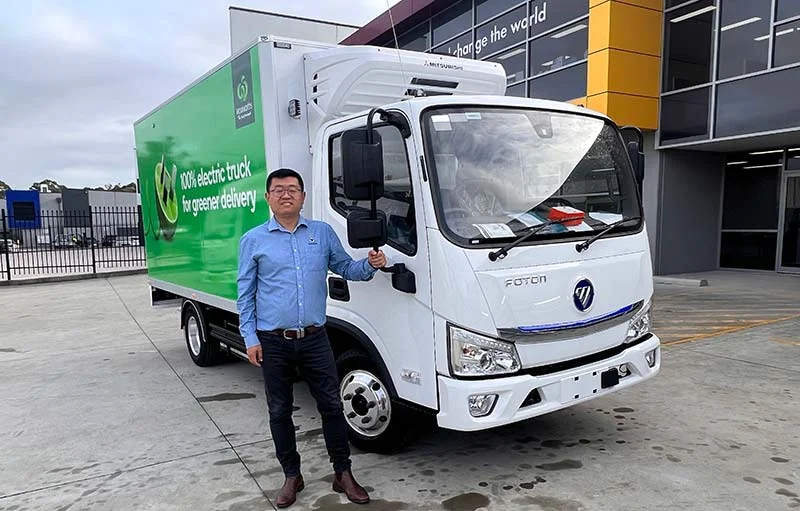Woolworths EV fleet commitment
BY FLEET EV NEWS TEAM JUNE 7, 2023
Woolworths Group has announced its aim to make all its home delivery trucks 100 per cent electric-powered by 2030, which will see more than 1,000 EVs added to the nation’s roads.
Woolworths Group has kick-started the transition by welcoming the first of 27 new EVs, which will begin delivering groceries to Woolworths’ Sydney customers over the next two months.
Woolworths home delivery fleet is currently made up of 1,200 trucks and growing. It is anticipated that the very last combustion engine vehicle will join the home delivery fleet by 2027, as they are gradually decommissioned and replaced with EVs.
Woolworths Group CEO, Brad Banducci said: “Our home delivery trucks are a familiar sight in neighbourhoods across Australia, and within the next seven years, we want to make every one of them electric, and free of fossil fuels.
“The case for a low carbon future has never been clearer and we’re backing a better tomorrow for our communities and the planet by starting the transition now.
“We’re proud to be putting 27 new EVs on the road in the coming weeks – in one of the many ways we’re working to make grocery shopping greener.
“Not only can we help make our suburban streets quieter and cleaner, but we hope to set an example for other businesses to support the growth of Australia’s EV industry.”
All 27 of the new home delivery EVs will be based in Sydney, delivering groceries to customers across the CBD, Inner West, Sutherland Shire, St George region and Eastern Suburbs. At present, public EV infrastructure to support commercial fleets remains limited. The trucks will operate out of Woolworths’ Customer Fulfilment Centres (CFC) in Mascot and Caringbah, which are dedicated to picking and packing the supermarket’s online orders. The CFCs have installed new EV charging infrastructure in preparation.
Woolworths Group’s new EVs consist of two models manufactured by Foton Motor and SAIC Motor, which both offer sufficient working range to complete daily metro home deliveries before returning to base to charge overnight. They are fitted with a new, state-of-the-art electric refrigeration system that runs off the vehicle’s battery, ensuring groceries stay cold.
The initial purchase of 25 Foton T5 Light Duty Electric trucks, fitted to Woolworths specifications is a major step for the Foton brand in the Australia market and demonstrates support for the Foton T5 truck for demanding last mile delivery work in Australia.
The T5 fits neatly within Woolworths Groups stated intent to decarbonise its transport and logistics operation by working collaboratively with its suppliers and partners to deliver on its sustainability agenda. Exploring zero emissions transport opportunities within their value chain is an important component of that collaboration.
Foton Mobility Distribution CEO Neil Wang said that the company was proud to be associated with such an iconic Australian brand, and to be able to partner with other proven Australian companies such as QTRS, TRS and NTI to deliver first class outcomes for both Woolworths and its customers.
Wang went on to say that the car licence 4.5 Tonne Foton T5, backed by a nationwide dealer and service network and now thousands of kilometres of proven global performance during its development, was the ideal vehicle for the last-mile Logistics industry.
Woolworths Group will continue to increase its use of electric and low emissions freight vehicles across its Primary Connect supply chain logistics business. The business is currently operating three electric heavy rigid vehicles, as it trials emerging technology to help decarbonise its fleet in the long-term. At present, the technology and infrastructure to support the load intensity and distances of long-haul freight is still in its infancy.
Woolworths Group also hopes to contribute to public infrastructure planning to ensure the right charging technology and locations are considered to meet the needs of electric metro fleets, as well as low emissions long-haul freighter trucks which will require accessible recharging points across regional Australia.
Through the business’ ongoing decarbonisation initiatives, by 2030 Woolworths Group intends to have reduced its overall operational transport emissions by around 60 per cent compared to today, and to have decomissioned more than 3,000 internal combustion engine vehicles from its company-wide fleet.
Woolworths Group’s climate commitments
2023
- Woolworths Group has reduced its operational emissions by 31 per cent since 2015.
2030
- Aim to transition all home delivery trucks to electric by 2030. Estimated to have reduced total Group transport emissions by around 60 per cent.
- The Group has set a target to reduce its operational emissions (Scope 1 and 2) by 63 per cent by 2030, in line with its contribution to the Paris Agreement’s goal to limit climate change to 1.5 degrees celsius – as validated by the UN-backed Science Based Targets Initiative.
- The Group has set a target to reduce its supply chain emissions (those created by suppliers ie Scope 3) by 19 per cent by 2030.
2050
- Woolworths Group has committed to become net carbon positive by 2050, if not sooner, which will see it exceed net zero to actively take more emissions out of the atmosphere than it produces.
 FOTON Mobility Distribution Pty Ltd
FOTON Mobility Distribution Pty Ltd